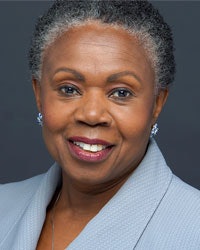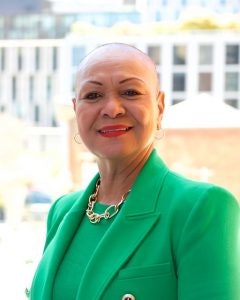At the height of the COVID-19 pandemic, epicenter New York City was a shadow of its former self. The streets were empty. Between July 2020 and July 2021, the U.S. Census found the city lost 15.7% of its population. Housing costs dropped and vacancies grew. In January 2021, the median rent for a one bedroom in the city was at its lowest point in years: $2,300 a month.
 Dr. Marva M. Craig, vice president for student affairs at BMCC.
Dr. Marva M. Craig, vice president for student affairs at BMCC.
But by the end of 2021, rents had jumped 36% and showed no signs of slowing, according to realty website Zumper. Median rents for a one bedroom in Tribeca, where BMCC is located, soared from their low of $3,079 in November 2020 to $5,500 in 2022.
The rising rents have made it increasingly more difficult for BMCC students to live near campus or to even find stable housing. BMCC is a commuter school and has no dormitories of its own. For almost two years after March 2020, New York state placed a moratorium on evictions, and rent increases were frozen in rent-regulated apartments. Those protections are now gone, and Craig said students are looking for assistance as their rents go up and landlords sue those in arrears.
But thanks to a $2 million grant from Trinity Church Wall Street, 40 housing insecure students at BMCC will live at no-cost in apartment-style dorms at City College of New York, a sister school in the City University of New York (CUNY) system. Their rooms and wrap-around support will be financially covered for up to three years.
“It’s very exciting for us, as a community college, especially in New York City, where housing is an issue,” said Craig. “It gives us an opportunity to talk about the community college experience of students and that we have housing needs.”
A 2019 survey of CUNY community college students found that 18% experienced homelessness in the previous year. But housing insecurity impacts students outside of New York as well. A 2022 survey of over 80,000 community college students across the country found that 14% experienced housing insecurity.
“We’ve always had a segment of our population that are homeless,” said Dr. Deborah C. Harte, director of the advocacy and resource center at BMCC. “The average family income of our students hovers around $30,000 a year, and many are way below that. So, when you look at our student profile in relation to being able to afford housing in New York City, I’m not surprised people are experiencing the housing insecurity they are.”
To qualify for the program, students must take at least nine credits, attend academic tutoring to keep their GPAs over 2.0, participate in internships, and receive support from an experienced residential advisor and a manager to build plans for financial success upon graduation. They must also be housing insecure, which Harte said BMCC defined as broadly as it could to help as many students as possible.
“Housing insecurity could include a number of things, couch surfing, living in a shelter, living with too many people in overcrowded situations, or domestic violence circumstances,” said Harte. “You could be in circumstances where every night you’re in a different home.”
Beatriz De La Torre, managing director for housing and homelessness at Trinity, said Trinity has partnered with BMCC in the past, working with Project Impact, a BMCC initiative supporting students who are or live with families that are justice impacted. Project Impact inspired Trinity to examine housing insecurity for all BMCC students.
“If you think education is the most important thing for economic mobility, to change the trajectory of somebody, then you should really focus on housing and providing stability to those students who’ve already taken the steps to get their education,” said De La Torre. “They are really motivated—they enrolled—they’re trying. But we know when you don’t have stable housing, that can get in the way and be exactly the barrier that derails you from that plan.”
 Dr. Deborah C. Harte, director of the advocacy and resource center at BMCC.
Dr. Deborah C. Harte, director of the advocacy and resource center at BMCC.
Harte is in charge of implementing the grant and selecting which students will benefit. She wants to make sure that those who receive this opportunity will not only be good students but also good roommates. The idea is not only to establish a safe space for study and living but to also build a community.
She is currently conducting student interviews to select the 40 who will receive the free housing, and Harte said winnowing the group is a heart wrenching process. But she’s grateful for the opportunity to help even some of these students gain stability to complete their studies.
“We’ll at least start to help some students get to the finish line of education, which puts them in a much better position than if they did not have an associate degree toward employment and a career path,” said Harte. “If you’re helping even one, I believe you’re really doing a tremendous service.”
The 40 will begin moving into their dormitory in November.
Liann Herder can be reached at [email protected].



















